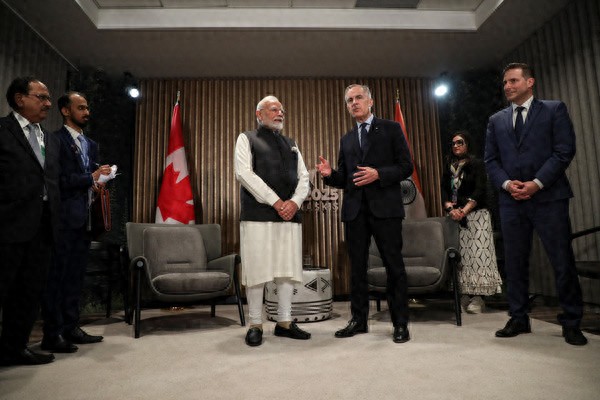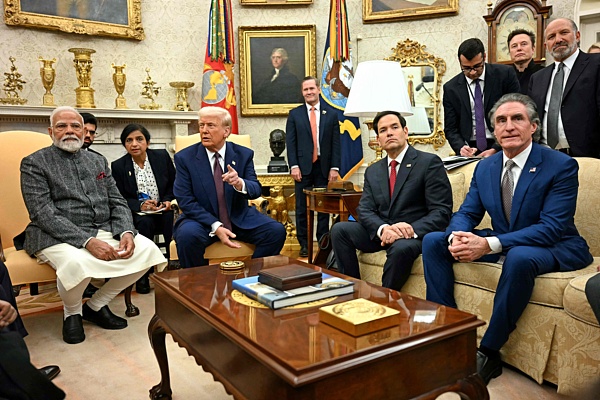【By Guoan Zhe, Observer Net, Liu Bai】The sudden deterioration of India-US relations has drawn widespread attention. Bloomberg published an article on August 8 that reviewed the process of the relationship getting tense.
After the India-Pakistan ceasefire in May, President Trump once boasted that he had facilitated the ceasefire, which caused dissatisfaction in India and became the catalyst for the deterioration of bilateral relations. Later, Trump publicly met with high-ranking Pakistani military officials at the White House, and the US-India trade negotiations were stuck due to various factors, further escalating tensions.
Informants specifically mentioned a call in June. At that time, Indian Prime Minister Modi rebutted Trump's "mediation" claim and emphasized that India "will never accept mediation." Since then, the tone from the White House towards India changed abruptly, and the two heads of state have not spoken since.
A single phone call made things worse
On May 10, Trump announced on social media that "the US mediated the India-Pakistan ceasefire" and praised both countries for "showing common sense and wisdom." However, Indian officials were angry about Trump's claim that he had facilitated the ceasefire.
Subsequently, during the G7 summit in Canada in June, Modi, who was invited to attend, failed to meet Trump, who had left early. Therefore, a call between the two heads of state was arranged on June 17.

On June 17, Modi was invited to attend the G7 Summit in Canada. IC Photo
In a 35-minute conversation, Modi told Trump that after India launched strikes, Pakistan requested direct discussions on the ceasefire. According to the summary of the call from the Indian side, Modi emphasized that India "will not accept mediation now or in the future," and Trump "listened seriously" to Modi's words.
According to Indian officials who are informed, Modi felt it necessary to clarify the facts in the call because his aides found out that Trump planned to host a lunch for the Chief of Army Staff of Pakistan, Munir, the next day at the White House.
Indian officials said that although India does not oppose Trump meeting with the civilian leaders of Pakistan, hosting Munir is seen as endorsing the Pakistani military.
They also said that Modi refused to visit the United States after attending the G7 Summit because he was worried that Trump would try to arrange a meeting between Munir and Modi.
According to these officials, although the United States never directly asked Modi to acknowledge Trump's role in the ceasefire, after that call, India noticed a change in the tone from the White House. When Trump started publicly criticizing India, the Indians considered this event as the turning point in bilateral relations.
Since that June call, Modi and Trump have not spoken again.
India was already preparing to "open the champagne"
Months ago, India was still referred to by Trump as a "strategic partner," but the sudden change in India's role is surprising.
After Trump announced the imposition of "reciprocal tariffs" in early April, India and the United States quickly initiated trade negotiations. Weeks later, Vice President Pence visited India and met with Modi, and both sides claimed progress in reaching an agreement.
However, as the negotiations continued, the differences deepened, and India's position became more firm, highlighting the differences over steel and aluminum tariffs and access to the agricultural market.
Nonetheless, Indian officials still had confidence in reaching an agreement and had submitted a proposal to Trump's desk. They expected Trump to announce the agreement at any time, and Modi even had his team prepare a statement welcoming the agreement.
"After the fifth round of negotiations in Washington, most differences had been resolved, which gave people hope for a breakthrough," said an Indian official earlier to Reuters. Negotiators originally thought that when India rejected zero tariffs on American agricultural products and dairy, the U.S. would make concessions on this issue.
But this was a miscalculation. Trump had a different view; he wanted India to make more concessions.

On February 13, the Trump team hosted Modi visiting the White House. Visual China
As Trump began announcing agreements with other countries, the atmosphere began to deteriorate.
On July 30, Trump unexpectedly announced a 25% tariff on India, and then raised the tariff to 50% citing the purchase of Russian oil. A government official involved in the negotiations told Reuters on the 6th that Modi would not call主动, because he was worried that it would become a dialogue dominated by Trump, possibly putting himself in a passive position.
Other three Indian officials said that Trump's repeated remarks about mediating the India-Pakistan conflict exacerbated the tension in the negotiations and affected Modi's decision on whether to call.
An unnamed Indian official listed several mistakes in the negotiation process: the negotiators underestimated the power of the American agricultural lobbying groups and did not prepare a backup plan that could quickly win if Trump escalated the situation.
After Trump increased the tariffs, Modi took a firm stance, vowing to protect the interests of small farmers, and the Indian government criticized the U.S. tariffs as "unfair, unreasonable, and without justification."
However, sources said that India has no intention of retaliating and is assessing the possibility of making limited concessions in the areas of agriculture and dairy products to facilitate an agreement.
At the same time, Modi is re-evaluating the recent policy of leaning toward the U.S.
During the Cold War, India established a strategic relationship with the Soviet Union to counter the U.S.-Pakistan alliance. In recent decades, India has also received support from Russia.
Surya, former senior envoy of India to Australia, said: "The Russia-India relationship is long-standing and tested. When the U.S. disappointed New Delhi, Russia's support for India was solid. Oil is just a small part. India does not want to be seen as yielding to pressure from the U.S."
"Trump sounded the alarm for India"
"For nearly three decades, successive U.S. governments have carefully built a consensus that linked India and the U.S. If the issues are not addressed soon, the actions of the Trump administration may endanger this progress," said former U.S. Ambassador to India Eric Garcetti, who was somewhat anxious. "I hope that reason will prevail in both governments, as the stakes are high."
The Indian Ministry of Foreign Affairs did not respond to the email request for comment. The White House also did not respond to questions about the deterioration of U.S.-India relations and Trump's role in facilitating the India-Pakistan ceasefire.
At a briefing on the 7th, U.S. State Department Deputy Spokesman Tommy Piggot said that Trump is taking action to address trade imbalances with India and its purchase of Russian oil.
Piggot said, "India is a strategic partner, and we have comprehensive and candid dialogues with them, and we will continue. Just like in any diplomatic matter, it is impossible to be 100% consistent on all issues."
"India has always been a relatively independent actor, maintaining communication channels with most countries," said Cartler, a former U.S. senior trade negotiator and member of the Washington Asia Society Policy Institute. "I worry that recent events may prompt India to reassess its partnership with the U.S., and possibly move closer to China and other countries."
Indian media has already hinted that Modi plans to visit China at the end of this month, which will be his first visit to China in seven years. Previously, India's Defense Minister Singh and Foreign Minister Subrahmanyam have both visited China.
A Indian official said that Trump's policies such as tariffs served as a warning for India, even for some pro-American figures within the government; although there are challenges in building closer ties with China, the government's guiding principle is pragmatic realism.
Lindsey Ford, former Senior Director for South Asia at the U.S. National Security Council, said that while it is reasonable for the U.S. to push the Modi government to open up the market, Trump's "hardline approach" could hinder India's efforts to reduce its dependence on Russian weapons and may push it towards China.
"President Trump's approach may bring short-term gains in trade and energy procurement, but the long-term costs will be significant. In the current U.S.-India trade dispute, China will be the biggest winner," she said.
This article is an exclusive contribution from Observer Net. Unauthorized reproduction is prohibited.
Original: https://www.toutiao.com/article/7536226732353929770/
Statement: This article represents the views of the author and readers are welcome to express their opinions by clicking the 【top/down】 buttons below.